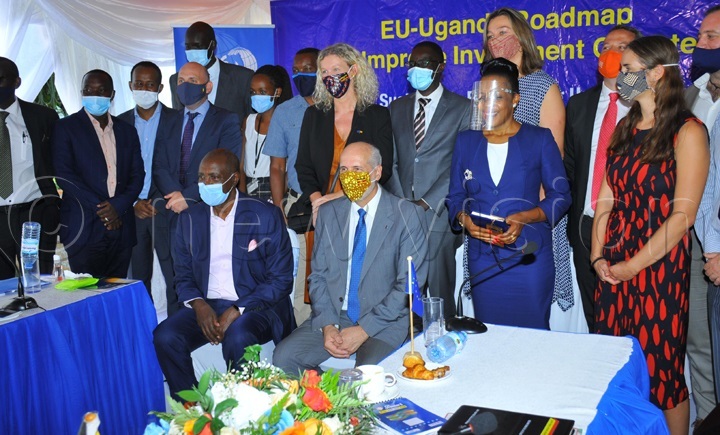EU, PSFU set up sh22.3b youth skilling fund
The youth training facility will initially run as a pilot project
The European Union (EU) has launched a €5m (sh22.3b) youth skilling fund to be administered by the Private Sector Foundation Uganda (PSFU).
This is part of initiatives under the Sustainable Business for Uganda platform that aims to advance the Uganda-European Union roadmap to the improved investment climate.
Statistics from the Ministry of Gender indicate that around 400,000 youth are released from Uganda's universities into the job market annually to compete for about 9,000 new jobs.
Speaking at a press conference to announce the training program at the residence of Elly Karuhanga, the PSFU chairman in Kampala, Ruth Biyinzika Musoke the head of the PSFU skills development facility said the youth training facility will initially run as a pilot project.
She noted that PSFU will welcome applicants from manufacturing, tourism, construction, and ICT sectors and place them in paid graduate internships for six months.
"When we spoke to employers they said that most of Uganda's fresh graduates are not ready to work. We will support Ugandans that have graduated at degree level to have the capacity and necessary skill to be ready to work," Musoke said.
"They will apply for the program and we will identify companies where they will work 3 to 4 days a week and go elsewhere for learning for 2 days a week. The learning areas will look at cognitive skills, and social skills," she added.
Musoke noted that most youth can't express themselves properly, they cannot effectively network and they cannot take responsibilities and this limited their career growth. She noted that before the new funding was signed, PSFU had secured internship placement for 1,000 Ugandans and 80,000 more.
Attilio Pacifici the Ambassador of the European Union Delegation to Uganda said that the Sustainable Business for Uganda (SB4U) identified priority areas to improve Uganda's business climate.

These include the availability of labour with the required skills and attitudes and the ease with which skills gaps could be filled from abroad, access to finance; and governance and corruption.
The platform comprises both Ugandan and selected EU private and public stakeholders, and be supported by a Secretariat. The Steering Committee of the Platform will be co-chaired by PSFU and the EU.
Pacifici noted that in addition to the €5m (sh22.3b) to train the youth to face new market needs, the EU had provided support for tourism worth €14m (sh62.5b) and several financial instruments to support small and medium enterprises in the agriculture sector.
"We have created something new with the private sector and it seems to work very well. We have established an environment based on mutual respect, on the commonality of interest and objectives, and of friendship as well," Pacifici said.
"There is a large demand for Ugandan products in Europe. Virtually anything you can produce can be consumed. Prepare yourself and go for the big markets, quality is crucial. We have been discussing that," he added. Pacifici noted that the new relationship between the EU and Uganda's private sector will create jobs.
The European Union is one of the leading development partners for Uganda, not only contributing to Uganda's development objectives through official development assistance but also through private sector investments and through trade.
In 2018 the European continent ranked only second to Africa as the final destination for Uganda's merchandise exports accounting for 15.8% of total exports according to data from ugandaeuropebusinessforum.com.
Italy, Germany, the Netherlands, Belgium, Spain, and Portugal are registered as the main consumers of Ugandan Products. In respect to imports, the European Union is a major source of manufactured products for the Uganda market - in 2018 importing goods from the EU to Uganda valued at €516m (sh2.3 trillion).
Furthermore, and according to the EU Investment Survey, the planned investment for the next 5 years from EU firms in Uganda stands at €646m (sh2.9 trillion).